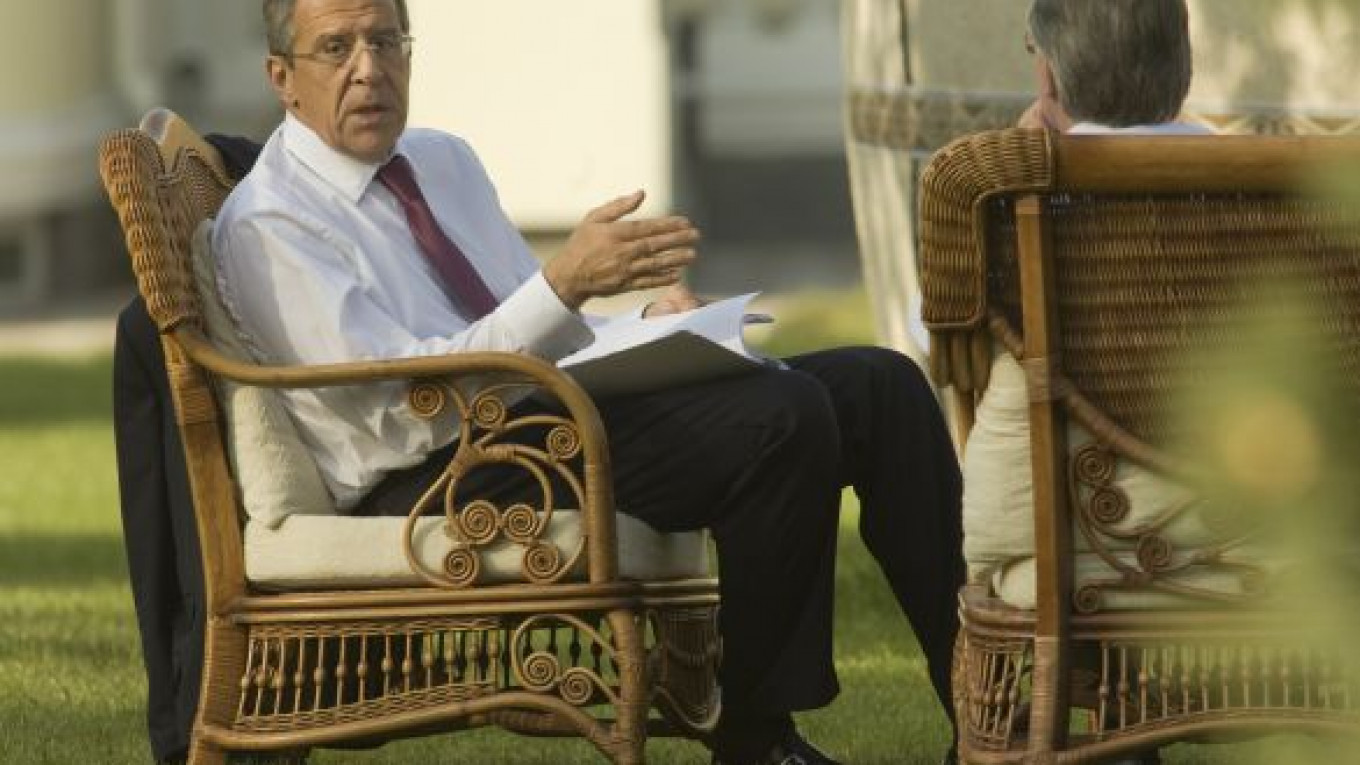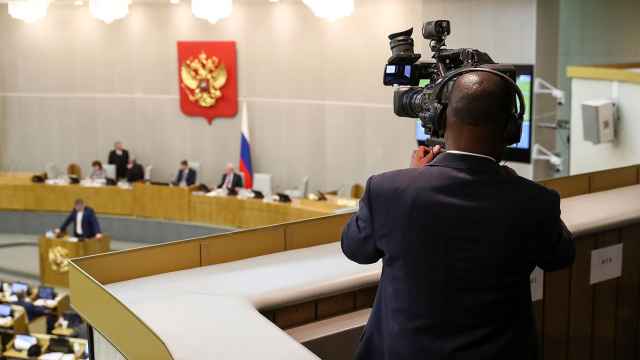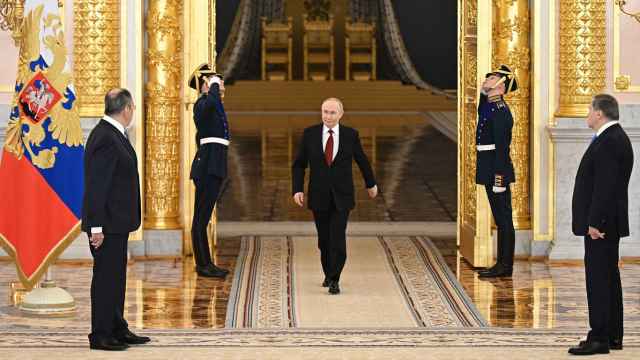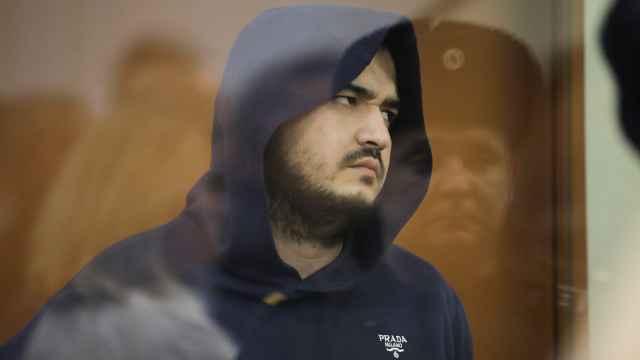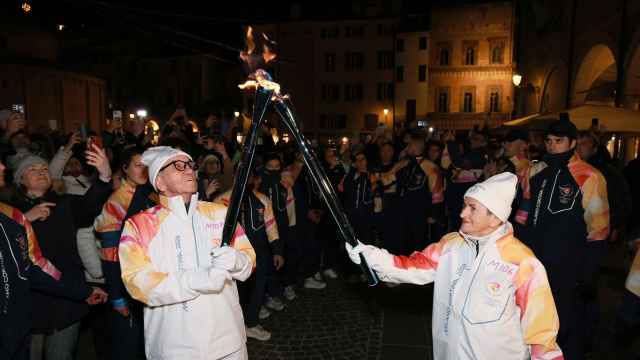Foreign Minister Sergei Lavrov has said "No" to the West so many times over Syria that he may come to rival a Cold War predecessor for the title of "Mr. Nyet."
The chain-smoking, battle-hardened diplomat is proving every bit as formidable as the long-serving Soviet stalwart Andrei Gromyko as Moscow holds out against a U.S.-led push for new sanctions on Syria and the removal of President Bashar Assad.
Lavrov is the cause of much hand-wringing and frustration in the West, where his country's policies are seen as an obstacle to ending the bloodshed in Syria.
But he has won plaudits in Russia for his stubborn defense of Moscow's position. For President Vladimir Putin, back in the Kremlin after a four-year absence, he is the right person in the right place at the right time.
At 62, the former UN ambassador seems to be relishing the challenge. Long accustomed to criticism, Lavrov has made an art of stonewall diplomacy and shrugs off each new attack on Russia's position on Syria by simply restating policy.
"It's a diplomatic game for Sergei Lavrov," said Fyodor Lukyanov, editor of the Russia in Global Affairs magazine.
Anyone who doubted Lavrov's stubbornness before the conflict in Syria should look back to 2003, when he defied attempts by then-UN Secretary General Kofi Annan to impose a smoking ban at the United Nations headquarters in New York. Lavrov carried on smoking, saying Annan "doesn't own this building."
Described by both admirers and rivals as highly professional and a tough negotiator, he also has a sharp tongue. Annan said he "learned to appreciate both his wisdom and his wit."
In nearly a decade as Moscow's UN envoy — a post Gromyko also held before becoming foreign minister in Soviet times — Lavrov won a reputation for digging in his heels. It was there he honed his skills in the cut and thrust of diplomacy that would at times be used later to antagonize rivals or partners who saw the world differently, including former U.S. Secretary of State Condoleezza Rice.
Glenn Kessler, a veteran journalist and member of the Council on Foreign Relations, a U.S. think tank, described him as "a showman who doesn't hesitate to use a diplomatic stiletto." Of his relationship with Rice: He knew how to "push her buttons," Kessler said.
Lavrov's expertise and reputation as a strong negotiator made him a natural choice for Putin when the president sought to replace Igor Ivanov as foreign minister in July 2004.
Although Putin is in charge of foreign policy as head of state, Russian experts say Lavrov is more than just an executor of policies dictated to him by the Kremlin.
"There's no one to touch him in terms of professionalism and as a communicator," said Vladimir Frolov, the former director of the National Laboratory for Foreign Policy, a think tank, and current head of a communication company called LEFF Group.
"His independence depends on the issue," he said. "On Syria, he is clearly very influential. He's pretty much the driver of policy, and he can claim with some credibility that he's pulled Russia back into the center of international decision-
making."
In the West, he and his country are assailed for blocking calls for Assad to leave power. When Annan quit as special envoy for Syria on Thursday, he complained of "finger-pointing and name-calling in the Security Council" and a lack of will for peace among the protagonists.
U.S. Secretary of State Hillary Clinton vented her frustration last month, saying Russia and China would "pay a price" for using their Security Council veto power to help keep the Syrian leader in power.
Lavrov's unsmiling response was simply to restate Russia's position, underlining that its policy was not shaped around keeping any individual in power and suggesting that Moscow was being subjected to blackmail to force it to change its position.
Moscow's stance is shaped partly by hard-nosed interests. Russia has a naval maintenance facility in Syria and sells arms to Damascus. It wants to keep a foothold in the Middle East.
But its battle is also ideological: Russia wants to halt what it sees as a Western drive to use the United Nations to topple leaders the West dislikes. There is no doubt Lavrov supports Moscow's policy on this wholeheartedly.
Putin's return to the Kremlin in May also appears to suit Lavrov, who kept his job when Dmitry Medvedev was elected president in 2008.
A senior Moscow-based diplomat said Lavrov has had a "much greater voice" in the government since Putin's return to the presidency and that "the real Lavrov" was back.
Lavrov, a career diplomat whose first posting was to Sri Lanka, will not stay in office as long as Gromyko, who was Soviet foreign minister for 28 years and earned the nickname "Mr. Nyet" for blocking Western moves at the United Nations.
But Lavrov, who is said by diplomatic sources to respect Gromyko, has shown he is a political survivor by keeping his job for eight years, despite talk of rivalry between him and Kremlin foreign policy adviser Sergei Prikhodko.
A member of the United Russia party, he is a pragmatist and has survived partly by presenting himself as a professional diplomat and avoiding playing any overt role in domestic politics.
Lavrov, who speaks English, French and Sinhalese, has come through repeated crises, defending Moscow's policies just as firmly on issues such as democracy and human rights as on the 2008 war with Georgia and wars with Chechnya.
It has not always been easy. When serving at the UN headquarters under President Boris Yeltsin, whose grip on power was often weaker than Putin's, Lavrov sometimes had to endure a frustrating wait for instructions. Once when he told fellow Security Council representatives that he was waiting for instructions from the government, he was heard mumbling: "That is, if I have a government."
When Russia was pressing for sanctions to be eased on Iraq, a U.S. official in a closed Security Council session told Lavrov that this would be like "approving a restaurant with cockroaches in the soup."
According to diplomatic sources, Lavrov answered: "We are not asking you to give Iraq five stars. We only want you to say that it is Kentucky Fried Chicken."
On one occasion he was reported by a British newspaper to have lost his cool by swearing at then-British Foreign Secretary David Miliband during a telephone call on the Georgia war.
The Foreign Ministry denied the report. Lavrov said he had quoted a European colleague who had referred to Georgia's leader as a "[expletive] lunatic."
Lavrov, who is married with one daughter, likes to relax by whitewater rafting with old friends once a year, plays the guitar and has written poetry as well as the anthem of the elite foreign relations institute in Moscow where he studied.
He does not suffer fools. If he loses patience, he will ask: "What are you talking about?" If he does not want to speak to reporters, he pins his cell phone to his ear.
"He reached for a Marlboro whenever he could and enjoyed a glass of Scotch whisky," said Evelyn Leopold, who covered him for years as a former Reuters UN correspondent.
Whatever Annan says, Lavrov will smoke if he wants to.
A Message from The Moscow Times:
Dear readers,
We are facing unprecedented challenges. Russia's Prosecutor General's Office has designated The Moscow Times as an "undesirable" organization, criminalizing our work and putting our staff at risk of prosecution. This follows our earlier unjust labeling as a "foreign agent."
These actions are direct attempts to silence independent journalism in Russia. The authorities claim our work "discredits the decisions of the Russian leadership." We see things differently: we strive to provide accurate, unbiased reporting on Russia.
We, the journalists of The Moscow Times, refuse to be silenced. But to continue our work, we need your help.
Your support, no matter how small, makes a world of difference. If you can, please support us monthly starting from just $2. It's quick to set up, and every contribution makes a significant impact.
By supporting The Moscow Times, you're defending open, independent journalism in the face of repression. Thank you for standing with us.
Remind me later.


